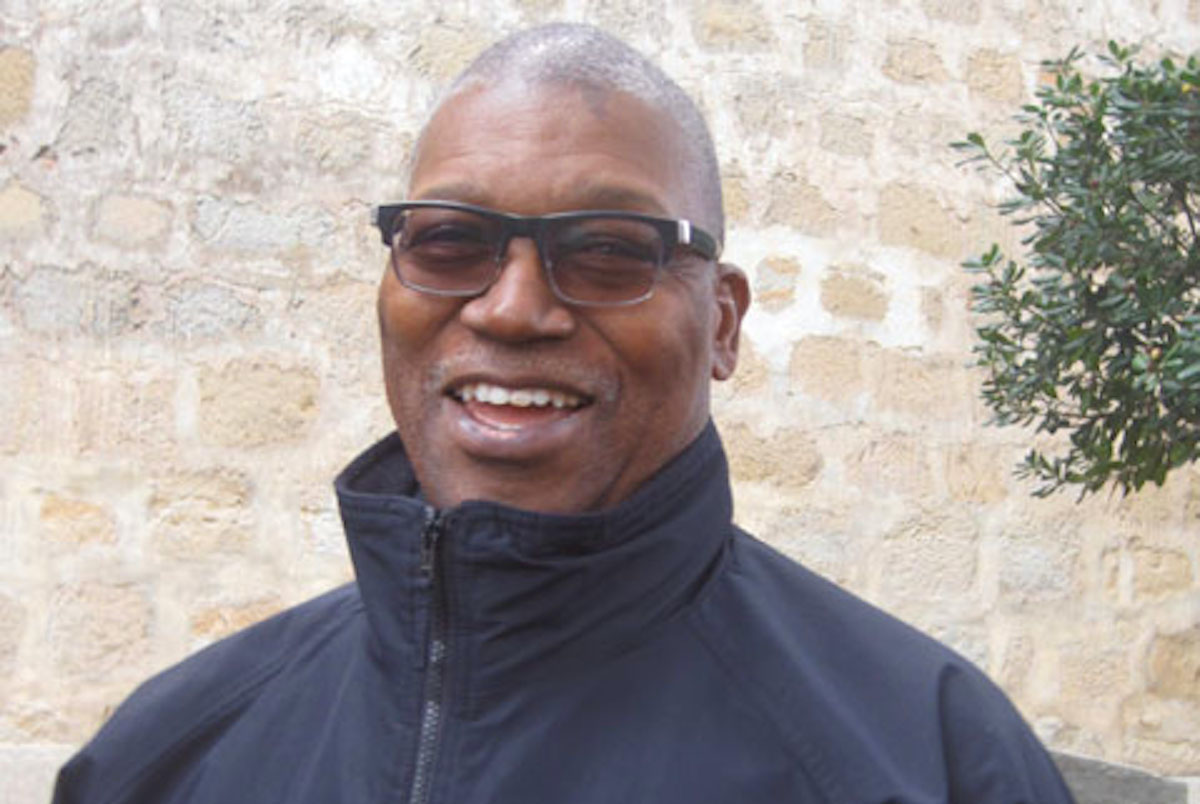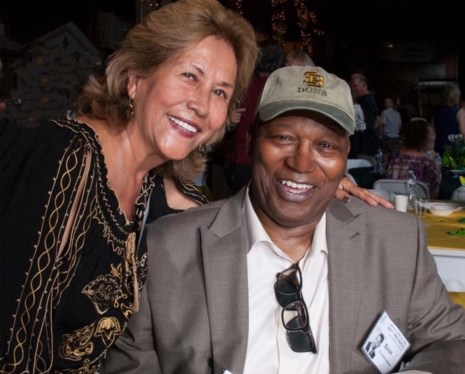
He stood there in jersey number 34, a statuesque figure (6′3″, 210 pounds) on thick, dark, muscled legs. It was September 3, 1968, my first day as a sports writer for the Santa Barbara News-Press, the opening day of football practice at Santa Barbara High School, and the first time I laid eyes on Sam Cunningham. I had played football a few years earlier and never saw a player like him. He was scary but beautiful.
Scary in the tumult of a football game — he would pummel people with devastating blocks and explosive runs. Beautiful off the field — he was friendly and approachable, as nice a man as you’d want to meet. It was as if his parents, Mabel and Sam Sr., migrants from Tennessee and Texas, channeled Santa Barbara’s gentle sunshine into their formidable son.
After scoring 39 touchdowns as fullback and making countless tackles as linebacker for the Santa Barbara Dons, he headed off to USC and became “Sam Bam.” His college career was bookended by two epic performances — his 135-yard foray against Alabama in 1970 that changed attitudes in the Deep South, and his four touchdowns on magnificent headlong dives through the Ohio State defense in the 1973 Rose Bowl. Then he played nine seasons in the NFL and set the career rushing record for the New England Patriots.
All of that was material for a sports writer to build a heroic profile, but all too often, the person does not live up to the image. The qualities that set Sam Cunningham apart and made him the brightest star in the constellation of sports figures during my lifetime were his genuineness, his honesty, and his decency.

His character came to the fore in high school. Gary Daigneault recalled being a diminutive 4′10″ freshman who was so relentlessly picked on and bullied that he dreaded going to school. Then one day, Sam Cunningham — whose locker was fortuitously next to his by alphabetical arrangement — came to his rescue.
Daigneault, an award-winning broadcast journalist, described the incident in a posting several years ago: “Drawing himself up to his full height, he announced in a loud voice, ‘From now on, anyone coming after him [pointing to me] will have to go through me.’ In that second, my life changed. The daily abuse stopped; the bullies stayed away; I was able to sleep, began to like school, and gradually came out of my shell. In that day, in that moment, that man changed my life. Thank you, Sam Cunningham.”
Cunningham’s football career landed him in numerous Halls of Fame, but he did not wallow in celebrity. He settled in Inglewood and with his wife, Cine, raised a daughter, Samahndi. He had a landscaping business. Early in the morning, he would ride a bicycle 10 or 15 miles with a neighbor.
Sometimes, I called him to plumb his memories. He enjoyed attending USC games on the sideline, but in 2010, the population of former players had gotten out of hand, and they were banned. The night of that year’s USC-Notre Dame game, Cunningham rode his bike across town to be near the Coliseum. He wound up at a Starbucks, listening to the game on his iPod. It was raining when he started to ride home, and he got a flat tire. He sat there in the rain, he told me, and lit up a cigar. He reflected on how miserable the Trojans must feel (they had lost to Notre Dame), and he said, “I thought how lucky I was. My senior year was perfect.”
That year, which ended with Sam Bam crashing into the Rose Bowl end zone four times (coach John McKay called his number to reward him for all the blocking he did while USC’s tailbacks got the glory), was indeed perfect for the undefeated Trojans, one of the strongest college teams ever assembled. And it perfectly fit Cunningham’s team-first ethos.
He explained it while bantering with friends in 2016 after attending the funeral of his SBHS teammate Dennis Rickard.
“The people that know me know what I did was not necessarily anything to do with me,” he said. “People come up and say, ‘Oh man, you so great’ … they don’t even know me. I was taught in elementary school to be a part of a team, not to be a star. If you’re a part of a team and you help your team win, then everybody gets a little bit of shine at the end of the day. That’s what 1972 was all about; we played as a team and won the national championship, not because I could fly over the line or whatever.”

He refused to stoke the myths surrounding USC’s 42-21 demolition of Alabama in 1970, when it was said, “Sam Cunningham did more to integrate Alabama in 60 minutes than Martin Luther King did in 20 years.” It was his first college game. He was not out to make history. “I just did not want to make a mistake,” he said. He ran the football as he was trained to do, with the physical power that he possessed. He helped the Trojans win convincingly, and if it made white folks in the South more accepting of Black football players, he was not sure how much it changed their minds about Black people in general.
Perhaps nobody gained more from that game than ’Bama coach Bear Bryant, who had tardily begun recruiting some Black players and now had license to open the gates to players who would help sweep him into the Hall of Fame. It was an oft-told story that Bryant took Sam into the Tide’s locker room and said, “This is what a football player looks like,” but Cunningham repeatedly denied it ever happened.
He resisted being chained to that moment, saying, “It’s only football; it’s only a game. It’s not the end of the freaking world. Life goes on, the journey of life.”
The last time I saw Sam was two years ago at the 50th reunion of his SBHS 1969 class. He was exceedingly happy to be among friends who knew him as the team player for the Dons, as the big man on campus who shamed bullies and did not need to puff out his chest.
When the Cunningham Track was dedicated at Peabody Stadium on July 3 to honor Sam and his younger brothers — Anthony, Bruce, and Randall — he called the night before to say he was hospitalized and would not be able to make it. But his condition did not appear to be grave. When her father died at his home on September 7, Samahndi Cunningham said it took the family by surprise.
“He meant the world to me,” Samahndi said. “He was an amazing dad, an amazing person. We were blessed.”
Who knows? Maybe Bear Bryant had been stuck outside the pearly gates for all those years and needed somebody strong and pure to help him get through.

You must be logged in to post a comment.